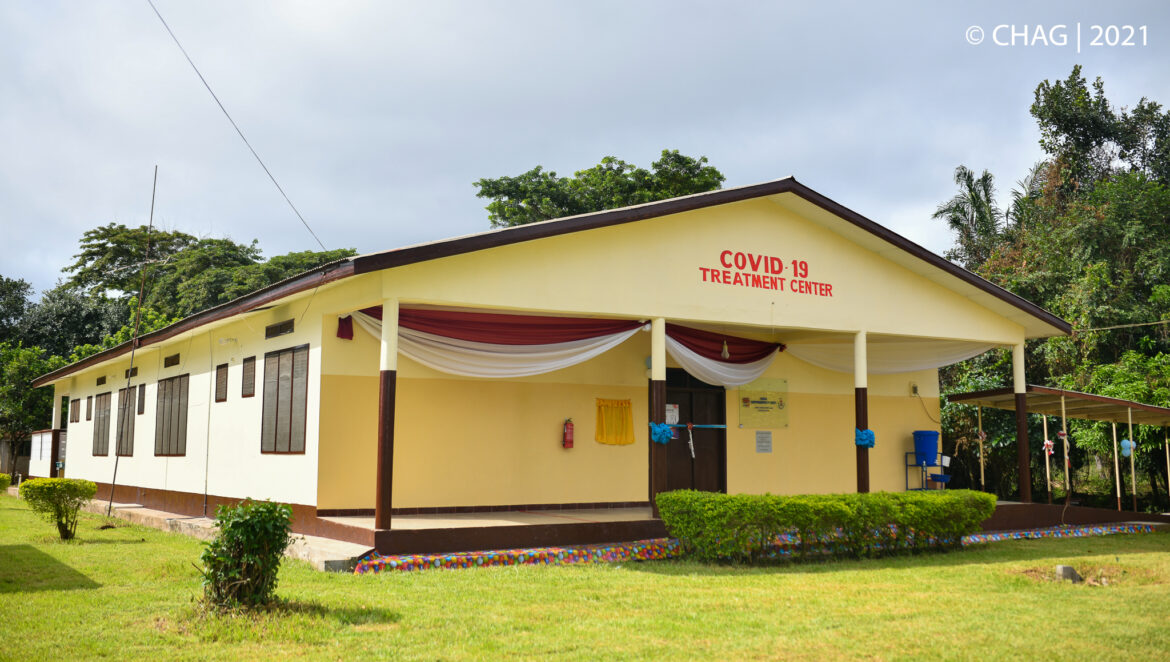With a yawing need to safeguard the health and safety of people especially in rural areas and mitigate the effect of the COVID-19 Pandemic, the Christian Health Association of Ghana (CHAG) has complemented the Government’s COVID-19 response with the launch of six COVID-19 testing sites.
Under the CHAG’s COVID-19 Response and Institutional Capacity Building (CRIB) Project with support from the UKAID, CHAG’s Executive Director, Dr. Peter Yeboah noted that the testing sites located in six facilities across five regions are fully equipped with the Polymerase Chain Reaction (PCR) test for COVID-19 equipment, with approval from the Food and Drug Authority (FDA) and certification from the Health Facilities Regulatory Agency (HeFRA).
The testing sites include Holy Family Hospital, Berekum, Bono Region; St Francis Xavier Hospital, Fosu, Central Region and St. Dominic Hospital, Akwatia, Eastern Region.
Others were the Bawku Presbyterian Hospital, Upper East; Wenchi Methodist Hospital, Bono East; and the S.D.A Hospital, Kwadaso, Ashanti Regions respectively.
He noted that since July 2020 the CRIB project has secured strategic collaboration with the Government at the District level, as well as the training of 6,412 health staff from 1,453 lower-level facilities in 40 Districts throughout the country. The training was on key thematic areas such as infection prevention control, screening and triaging, and contact tracing, he noted and added that there are 15 COVID-19 Treatment Centres within the 40 District with 200 staff being trained on case management.
Launching the CHAG Testing Programme, Mr. Kwaku Agyeman-Manu, Minister for Health recounted how Ghana experience the COVID-19 fight since the country recorded its index case in march 2020, through the leadership of the President.
In building resilient healthcare, the Minister acknowledged the role of CHAG in helping increase the COVID-19 testing centers in rural areas, adding that the relationship between the Church and State has been deepened.
Likewise, Dr. Patrick Kumah Aboagye, Director General, Ghana Health Service (GHS) stated that “our collaboration with CHAG in building the capacity of our District Directors and facility heads cannot be overemphasized because the work of the service is mainly at the district level”.
“We started with two labs at the outset of the pandemic which has now increased to 36 labs” he noted and commended CHAG for adding six new testing centers.
As Easter approached, the Director-General advised Ghanaians not to lose guard but to continue abiding by the COVID-19 safety protocols, including wearing a facemask, regular handwashing with soap under running water, and observing social distancing.
Acting British High Commissioner and Development Director of the Foreign Commonwealth and Development Office (FCDO), Philip Smith stated that since the outbreak of the COVID-19 pandemic, the UK has repurposed £6 million of its bilateral funds to support Ghana, of which the CRIB project is part.
While commending the government for completing the first phase of the vaccination exercise, he encouraged the government to continue work to ensure that every region in Ghana is equipped to meet the COVID-19 challenge and supported in delivering essential health services.
With the upward trajectory of cases globally, the Acting High Commissioner appealed to Ghanaians to continue adhering to the COVID-19 safety protocols especially as we enter the Easter period.
In his remarks, Prof. William Ampofo, Coordinator of the National COVID-19 Laboratories Network, stated that the launch of the testing sites was a significant milestone in Ghana’s COVID-19 strive, and extolled CHAG for its effort as well as the UKAID for the support.
The Registrar HeFRA, Dr. Philip Bannor who presented the certificates to the six facilities hosting the testing sites, commended CHAG for the extensive work done in upgrading the laboratories and bringing them to standard.
Essentially, CHAG’s focus on the health of the rural folks in the District and the sub-district level was borne out of the mission of the organization and as an effort to help breach health inequalities and mitigate morbidity, mortality, and socioeconomic scourge of the COVID-19 pandemic.
The CRIB Project which started in July 2020, has so far contributed to supporting risk communication campaigns including contact tracing, case management, PPE Supply among others, as well as building intuitional capacities to continue delivering healthcare. Other areas of the project include monitoring and evaluation of COVID-19 impact on health service delivery and sharing lessons learned in implementing COVID-19 measures within the health system.
